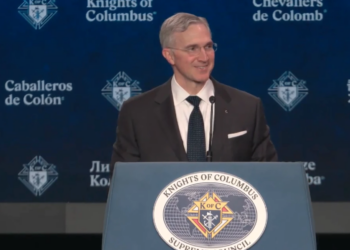
The U.S. Court of Appeals for the District of Columbia Circuit on Wednesday lifted a lower court’s preliminary injunction that had blocked the Trump administration from reducing foreign aid for fiscal year 2024, marking another legal win for the White House.
The case began after multiple organizations, including the AIDS Vaccine Advocacy Coalition and Journalism Development Network, Inc., filed suit challenging the administration’s decision to scale back foreign aid.
The plaintiffs argued that the funding cuts violated spending laws and overstepped presidential authority.
Trump’s Sovereign Wealth Fund: What Could It Mean For Your Money?
Writing for the majority, Judge Karen LeCraft Henderson held that the plaintiffs lacked the legal standing to sue over the matter.
The D.C. Circuit just handed the Trump Administration another victory in tossing aside the injunction requiring the State Department to make foreign aid payments. It is only the latest district court to be overruled on these injunctions as invasive of Article II authority.
— Jonathan Turley (@JonathanTurley) August 13, 2025
Henderson explained that their claims were not sufficient under constitutional “separation of powers” arguments when their primary allegations centered on violations of federal spending statutes.
This Could Be the Most Important Video Gun Owners Watch All Year
She further stated that the plaintiffs could not proceed under the Administrative Procedure Act (APA) because the Impoundment Control Act (ICA) specifies that only the Comptroller General has the authority to bring legal action under that statute.
The dispute traces back to President Donald Trump’s first day in office, when he signed an executive order directing the State Department and the U.S. Agency for International Development (USAID) to pause all new foreign aid obligations.
The stated purpose was to allow the administration to review each program and determine whether to continue funding.
Earlier this year, U.S. District Judge Amir Ali had issued the preliminary injunction, siding with the plaintiffs.
Ali ruled that the administration’s decision to halt and reduce foreign aid likely ran afoul of congressional spending authority as outlined in the 2024 Appropriations Act, the Impoundment Control Act, and the Anti-Deficiency Act.
He wrote that the president’s power to cut foreign aid was “at its lowest ebb” when acting contrary to the will of Congress.
In overturning that ruling, Henderson cited the U.S. Supreme Court’s 1994 decision in Dalton v. Specter, which held that statutory disputes cannot be reframed as constitutional claims to bypass legal restrictions on lawsuits.
Henderson emphasized that while some aid groups may experience harm from the funding freeze, they were unlikely to prevail on the merits of the case.
The appellate court’s decision did not address whether the administration’s foreign aid freeze is ultimately lawful or constitutional.
Instead, it found that the policy should not be blocked while litigation continues.
The ruling effectively allows the administration to move forward with its review and potential reduction of foreign aid programs during the ongoing legal process.
Another @TheJusticeDept victory in court for President Trump’s agenda!
In a 2-1 ruling, the DC Circuit lifted an injunction ordering President Trump to spend hard-earned taxpayer dollars on wasteful foreign aid projects.
We will continue to successfully protect core…
— Attorney General Pamela Bondi (@AGPamBondi) August 13, 2025
Efforts to cut foreign aid have also been underway in Congress.
In July, the Senate passed a measure by a 51–48 vote that would eliminate roughly $8 billion in foreign aid and rescind an additional $9 billion in previously approved funds.
Supporters of the cuts argue the savings should be redirected to domestic priorities, while opponents warn of negative diplomatic and humanitarian consequences.
The plaintiffs in the case have not yet indicated whether they plan to appeal the ruling or seek further relief.
The legal fight continues as the broader political debate over the scope and purpose of U.S. foreign aid remains unresolved.

![Even CNN Admits Trump Is the Most 'Influential President During This Century' [WATCH]](https://www.right2024.com/wp-content/uploads/2025/08/Even-CNN-Admits-Trump-Is-the-Most-Influential-President-During-750x375.jpg)



![Gavin Newsom Threatens to 'Punch These Sons of B*thces in the Mouth' [WATCH]](https://www.right2024.com/wp-content/uploads/2025/08/Gavin-Newsom-Threatens-to-Punch-These-Sons-of-Bthces-in-350x250.jpg)
![ICE Arrests Illegal Alien Influencer During Her Livestream in Los Angeles: ‘You Bet We Did’ [WATCH]](https://www.right2024.com/wp-content/uploads/2025/08/ICE-Arrests-Illegal-Alien-Influencer-During-Her-Livestream-in-Los-350x250.jpg)








